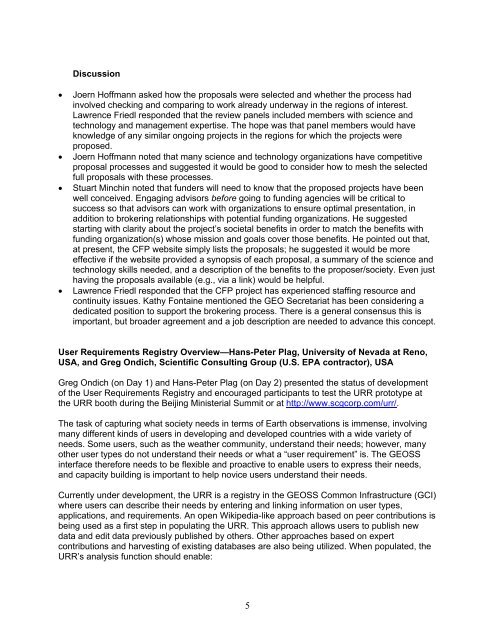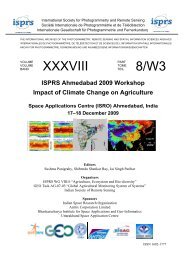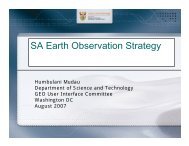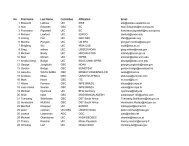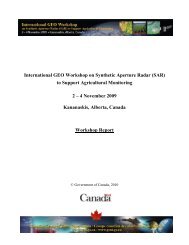GEO UIC Committee: - Group on Earth Observations
GEO UIC Committee: - Group on Earth Observations
GEO UIC Committee: - Group on Earth Observations
You also want an ePaper? Increase the reach of your titles
YUMPU automatically turns print PDFs into web optimized ePapers that Google loves.
Discussi<strong>on</strong><br />
• Joern Hoffmann asked how the proposals were selected and whether the process had<br />
involved checking and comparing to work already underway in the regi<strong>on</strong>s of interest.<br />
Lawrence Friedl resp<strong>on</strong>ded that the review panels included members with science and<br />
technology and management expertise. The hope was that panel members would have<br />
knowledge of any similar <strong>on</strong>going projects in the regi<strong>on</strong>s for which the projects were<br />
proposed.<br />
• Joern Hoffmann noted that many science and technology organizati<strong>on</strong>s have competitive<br />
proposal processes and suggested it would be good to c<strong>on</strong>sider how to mesh the selected<br />
full proposals with these processes.<br />
• Stuart Minchin noted that funders will need to know that the proposed projects have been<br />
well c<strong>on</strong>ceived. Engaging advisors before going to funding agencies will be critical to<br />
success so that advisors can work with organizati<strong>on</strong>s to ensure optimal presentati<strong>on</strong>, in<br />
additi<strong>on</strong> to brokering relati<strong>on</strong>ships with potential funding organizati<strong>on</strong>s. He suggested<br />
starting with clarity about the project’s societal benefits in order to match the benefits with<br />
funding organizati<strong>on</strong>(s) whose missi<strong>on</strong> and goals cover those benefits. He pointed out that,<br />
at present, the CFP website simply lists the proposals; he suggested it would be more<br />
effective if the website provided a synopsis of each proposal, a summary of the science and<br />
technology skills needed, and a descripti<strong>on</strong> of the benefits to the proposer/society. Even just<br />
having the proposals available (e.g., via a link) would be helpful.<br />
• Lawrence Friedl resp<strong>on</strong>ded that the CFP project has experienced staffing resource and<br />
c<strong>on</strong>tinuity issues. Kathy F<strong>on</strong>taine menti<strong>on</strong>ed the <str<strong>on</strong>g>GEO</str<strong>on</strong>g> Secretariat has been c<strong>on</strong>sidering a<br />
dedicated positi<strong>on</strong> to support the brokering process. There is a general c<strong>on</strong>sensus this is<br />
important, but broader agreement and a job descripti<strong>on</strong> are needed to advance this c<strong>on</strong>cept.<br />
User Requirements Registry Overview—Hans-Peter Plag, University of Nevada at Reno,<br />
USA, and Greg Ondich, Scientific C<strong>on</strong>sulting <str<strong>on</strong>g>Group</str<strong>on</strong>g> (U.S. EPA c<strong>on</strong>tractor), USA<br />
Greg Ondich (<strong>on</strong> Day 1) and Hans-Peter Plag (<strong>on</strong> Day 2) presented the status of development<br />
of the User Requirements Registry and encouraged participants to test the URR prototype at<br />
the URR booth during the Beijing Ministerial Summit or at http://www.scgcorp.com/urr/.<br />
The task of capturing what society needs in terms of <strong>Earth</strong> observati<strong>on</strong>s is immense, involving<br />
many different kinds of users in developing and developed countries with a wide variety of<br />
needs. Some users, such as the weather community, understand their needs; however, many<br />
other user types do not understand their needs or what a “user requirement” is. The <str<strong>on</strong>g>GEO</str<strong>on</strong>g>SS<br />
interface therefore needs to be flexible and proactive to enable users to express their needs,<br />
and capacity building is important to help novice users understand their needs.<br />
Currently under development, the URR is a registry in the <str<strong>on</strong>g>GEO</str<strong>on</strong>g>SS Comm<strong>on</strong> Infrastructure (GCI)<br />
where users can describe their needs by entering and linking informati<strong>on</strong> <strong>on</strong> user types,<br />
applicati<strong>on</strong>s, and requirements. An open Wikipedia-like approach based <strong>on</strong> peer c<strong>on</strong>tributi<strong>on</strong>s is<br />
being used as a first step in populating the URR. This approach allows users to publish new<br />
data and edit data previously published by others. Other approaches based <strong>on</strong> expert<br />
c<strong>on</strong>tributi<strong>on</strong>s and harvesting of existing databases are also being utilized. When populated, the<br />
URR’s analysis functi<strong>on</strong> should enable:<br />
5


